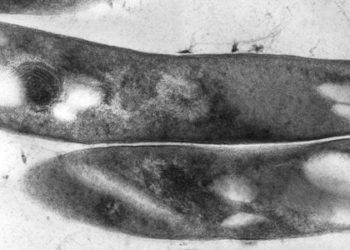Gene therapy provides immune boost in SCID-X1 patients
1. This study demonstrates that autologous CD34+ cells led to immune reconstitution in the majority of patients with X-linked severe combined immunodeficiency.
2. Thus far, there have been no adverse events linked with gene therapy, and there have been no cases of leukemia reported at a median follow-up of 33.0 months.
Evidence Rating Level: 4 (Below Average)
Study Rundown: X-linked severe combined immunodeficiency (SCID-X1) is an inherited condition that results from mutations in the gene responsible for interleukin-2 receptor Υ-chain (IL2RG). Patients with SCID-X1 often die before 1 year of age from community-acquired or opportunistic infections, unless they are treated with allogeneic hematopoietic stem-cell transplantation (HSCT). While HSCT from matched-sibling donors is associated with high survival, mismatched related or matched unrelated donor transplantation has resulted in poor survival and high rates of complications. Previously, trials have demonstrated that treating patients with SCID-X1 with autologous CD34+ cells transduced with a retroviral vector expressing Υc complementary DNA led to reconstitution of T-cells and disease-free survival similar to matched-sibling donor allogeneic HSCT. In these studies, however, mutagenesis led to high rates of T-cell acute lymphoblastic leukemia. This study explored the effects of CD34+ cells transduced with a Υ-retroviral vector, which has been shown to be less mutagenic.
In summary, 9 patients were followed for a median of 29.1 months; 8 patients survived and 7 patients had resolution of their previous infections. One patient died from previous systemic adenoviral disease. There were no serious adverse events and no cases of leukemia at this point in follow-up. While the study demonstrates restoration of immunity in the majority of patients, follow-up has been shorter compared with previous trials. Long-term follow-up is needed to ensure sustained efficacy of these treatments, and for continued monitoring for adverse events, such as leukemia.
Click to read the study, published today in NEJM
Relevant Reading: Gene therapy of human severe combined immunodeficiency (SCID)-X1 disease
In-Depth [prospective case series]: This study involved 9 boys with confirmed IL2RG mutations and immunologic profiles characteristic of SCID-X1. Enrolment was offered to infants and children who lacked an HLA-identical donor, or had an active, therapy-resistant infection. A γ-retroviral vector was developed and expressed IL2RG complementary DNA from the eukaryotic human elongation factor 1α short promoter, which has been shown to be less mutagenic than previous efforts. CD34+ cells were purified from bone marrow and transduced using the retroviral vector. The coprimary endpoints of the trial were the reconstitution of CD3+ cell number and function, and the occurrence of severe adverse events resulting from gene therapy.
Eight of the 9 patients had no expression of Υc prior to treatment. Eight of the 9 also had SCID-related infections (i.e., disseminated bacille Calmette-Guérin, Epstein-Barr lymphoproliferation, severe systemic adenoviral disease). The median age at infusion of autologous CD34+ cells was 8.0 months. The median dose of CD34+ cells infused was 7.8×106 per kg (range 3.7×106 to 11.7×106). One patient, who received cells with a low vector copy number, required a second infusion 17.5 months after the initial infusion. With a median follow-up time of 29.1 months (range 12.1-38.7 months), 8 of the 9 children have survived. One patient died from pre-existing systemic adenovirus infection 4 months after gene therapy, but infections were resolved in 7 other patients. Compared to previous trials, there were no significant differences in the rate of T-cell reconstitution (p=0.39 at 6 months, p=0.28 at 1 year). No severe adverse events related to gene therapy have been reported thus far. A subsequent addition to the article stated that there were no diagnoses of leukemia at a median follow-up of 33.0 months.
Image: PD
©2012-2014 2minutemedicine.com. All rights reserved. No works may be reproduced without expressed written consent from 2minutemedicine.com. Disclaimer: We present factual information directly from peer reviewed medical journals. No post should be construed as medical advice and is not intended as such by the authors, editors, staff or by 2minutemedicine.com. PLEASE SEE A HEALTHCARE PROVIDER IN YOUR AREA IF YOU SEEK MEDICAL ADVICE OF ANY SORT.







